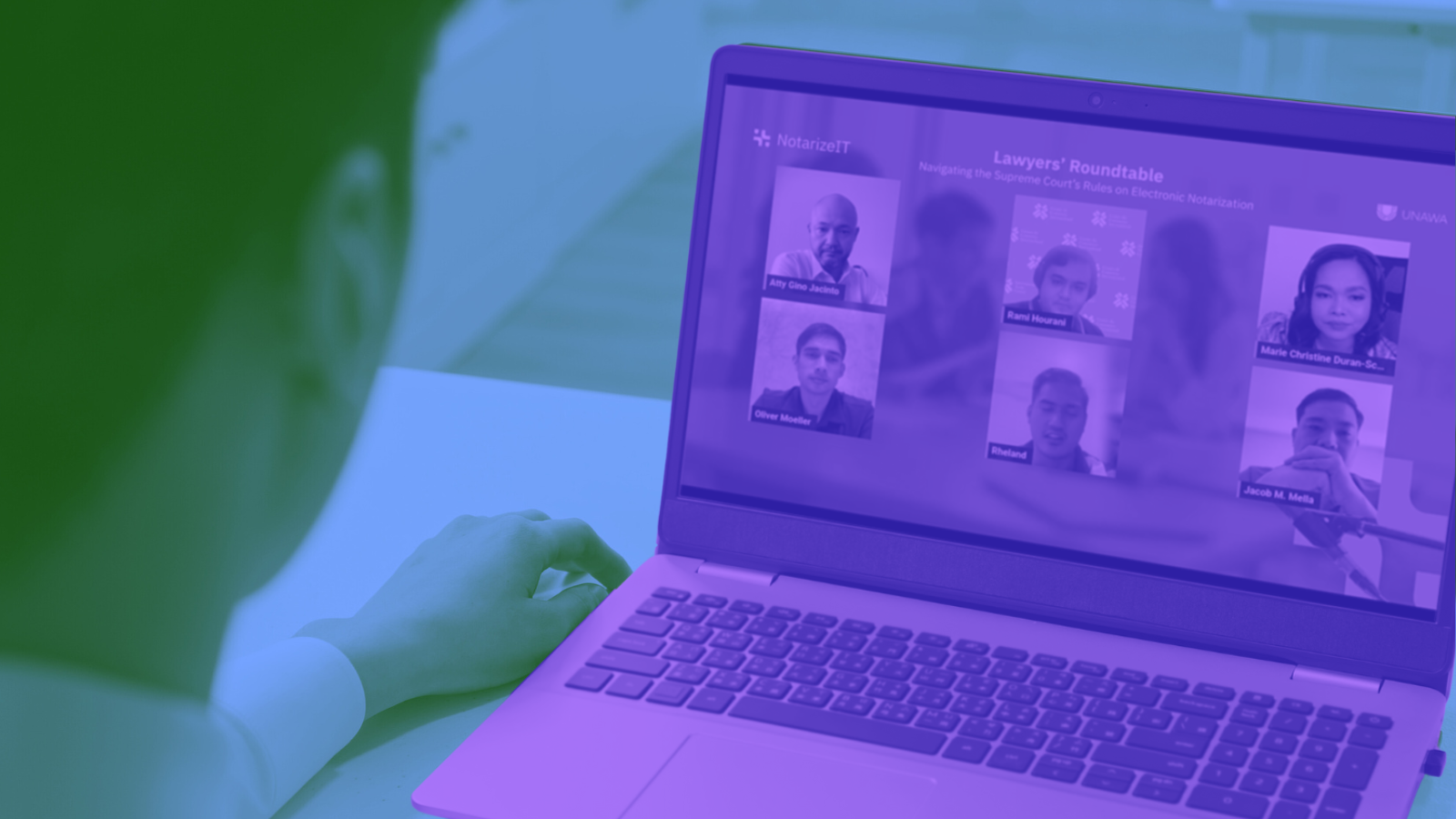
Last July 16, I had the privilege of moderating the Lawyers’ Roundtable on Navigating the Supreme Court’s Rules on Electronic Notarization—a free online event hosted by UNAWA and attended by over 60 legal professionals across the country. This timely discussion explored the legal, practical, and cultural implications of the Supreme Court’s recently released A.M. No. 24-10-14-SC. We tackled questions that every lawyer, notary, and business should now be asking: How do we adopt and implement electronic notarization in the Philippines? What will it mean for our clients, our practice, and the justice system as a whole?
The hour-long conversation moved quickly but meaningfully. I’m grateful to the panelists who brought their depth, candor, and perspective to the table: Atty. Rheland Servacio, Atty. Marie Christine Duran-Schulze, Atty. Rami Hourani, Atty. Jacob Mella, and Atty. Julius Oliver Moeller. Together, they represented a cross-section of Philippine legal practice, encompassing litigation, corporate law, development work, and regulatory compliance. Their insights helped frame the new rules not just as a procedural update, but as a cultural and professional shift.
We began with a simple question: Will Filipinos trust an electronically notarized document as much as a physically signed one? The answers varied, but the consensus leaned toward optimism—with caveats. Trust, as many pointed out, depends on exposure, education, and user experience. One panelist noted that digital banking faced similar doubts during its early years, yet now enjoys widespread use. Another emphasized that the law must not only enable innovation, it must lead in setting expectations for security and integrity.
Throughout the discussion, the panelists agreed that technology alone cannot guarantee adoption. Public education and professional readiness must go hand in hand. Several speakers highlighted the need to educate not just clients but also lawyers. Many legal professionals still equate notarization with the use of ink, seals, and face-to-face witnessing. However, with the rules now clearly defining Remote and In-Person Electronic Notarization (REN/IEN), it’s time to realign our practices with what is legally sound and digitally secure.
We also talked about the challenges. Some panelists raised valid concerns about infrastructure gaps, especially in rural areas. Others pointed to risks of fraud and the difficulty of verifying identities without proper tech safeguards. Still, everyone acknowledged the opportunity to improve access to justice through electronic notarization in the Philippines. Imagine an elderly client in a remote barangay, a busy OFW renewing documents abroad, or a small business owner rushing to meet a compliance deadline. E-notarization could remove barriers that previously made legal services slow, expensive, or inaccessible.
On the compliance side, the conversation grew more technical, but no less critical. We discussed the steps needed to ensure that every notarized digital document remains tamper-proof, verifiable, and enforceable in court. Panelists emphasized the importance of selecting platforms that meet these standards and adhere to the Supreme Court’s guidelines. This is our goal at UNAWA, through technology, to help notaries navigate the transition while maintaining the same level of legal rigor expected from traditional methods.
Another important takeaway was the role of leadership among lawyers themselves. As one speaker put it, “We can’t ask our clients to trust something we haven’t embraced ourselves.” That statement stuck with me. As legal professionals, we must lead by example—not just in compliance, but in mindset. Embracing electronic notarization in the Philippines doesn’t mean abandoning tradition; it means evolving with it, using tools that enhance—not replace—our legal authority and credibility.
Looking ahead, UNAWA remains committed to creating platforms, tools, and spaces for dialogue, such as this roundtable. The legal system doesn’t change overnight, but it moves forward when stakeholders come together to understand what’s new, what’s possible, and what’s needed. We will continue hosting free information sessions like this to guide both professionals and the public in navigating the next phase of legal transformation.
I want to thank everyone who joined us. Your participation demonstrates a genuine interest in thoughtful, practical discussions on electronic notarization in the Philippines. If you missed this session, I invite you to sign up for future events and updates through our website. We’re also opening doors for guest panelists, so if you have experience, insights, or questions to share, we want to hear from you.
Let’s continue this conversation—because the future of our legal system doesn’t just belong to the digital world; it belongs to those ready to lead it.